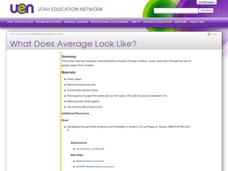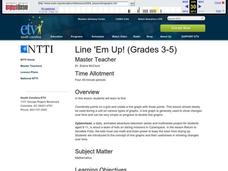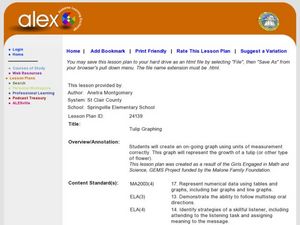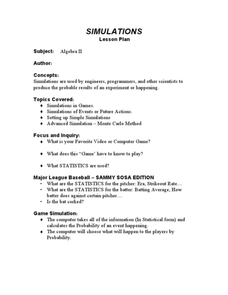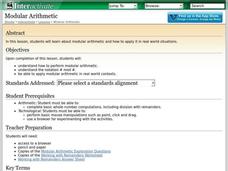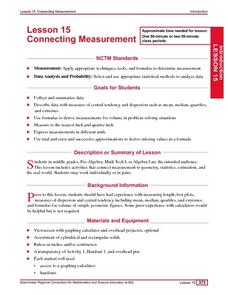Curated OER
Asthma "Outbreak" Exercise
Students investigate numerical data on a possible asthma epidemic. Using statistical information, students graph and figure ratios of the epidemic. They evaluate the mortality rate from severe smog in the 1950's in London.
Curated OER
The Cube and Coin Challenges
Second graders participate in several games based on colored cubes and coins. They try to figure out the relative rate at which things happen and assess the concept of playing a fair game with their peers. Each student compare familiar...
Curated OER
Graphing
Students collect data to create different types of graphs-line, pie, and bar graphs. They use StarOffice 6.0 to create graphs.
Curated OER
What Does Average Look Like?
Fifth graders explore the concepts of range, median, mode, and mean through the use of graphs drawn from models. They use manipulatives to represent data they have collected within their groups, and compare the differences between mode,...
Curated OER
Line 'Em Up!
Students find coordinate points on a grid and create a line graph with those points. This lesson should ideally be used during a unit on various types of graphs. They make and use coordinate systems to specify locations and to describe...
Curated OER
A Fishy Problem
Students survey the problems involved in finding a solution to a practical problem using a mathematical process. Students make sensible estimates and check the reasonableness of their answers. Students report the results of their...
Curated OER
Spending Plans
Students explore the concept of dividing their money into categories, namely "save," "spend," and "share." They engage in activities that help them explain that money is limited in quantity and must be divided for different purposes.
Curated OER
Figuring Elapsed Time
Students discover the concept of elapsed time. In this calculating time lesson plan, students utilize the Internet to complete record sheets based on the concept of elapsed time. Finally, the students answer questions on their own.
Curated OER
Tulip Graphing
Students create a graph of tulip growth. In this data analysis lesson, students plant tulip bulbs and use graph paper to begin graphing data on the growth of the tulip.
Curated OER
Simulation and Statistics
Students perform simulation of video games as they explore statistics. In this algebra lesson plan, students relate concepts of statistics and data collection to solve problems. They decide their next step based on the previous...
Curated OER
Students use fundamental counting principle to compute combinations and permutations
Students define Pascal's triangle and special notations used to represent nth elements. For this geometry lesson, students solve problems using permutations and combinations. They compare the formula for permutation to that of Pascal's...
Curated OER
Recognizing Patterns
Students explore the concept of patterns. In this patterns lesson, students use applets to manipulate tessellations. Students predict the next number in a sequence by recognizing patterns.
Curated OER
Modular Arithmetic
Students investigate modular arithmetic and how to use it to solve real world problems. In this modular arithmetic instructional activity, students use computers to work on modular arithmetic after a teacher guided instructional...
Curated OER
Clock Arithmetic and Cryptography
Students explore the concept of modular arithmetic and cryptography. In this modular arithmetic and cryptography activity, students use applets to explore modular arithmetic using a clock and Caesar Ciphers. Students exchange their...
Curated OER
Misleading Graphs
Students explore number relationships by participating in a data collection activity. In this statistics instructional activity, students participate in a role-play activitiy in which they own a scrap material storefront that must...
Curated OER
Fractions
Fourth graders explore fractions. They use Skittles and M&M's to practice adding and subtracting fractions. Students review the numerator and the denominator of fractions. They count the number of each color of Skittles and M&M's...
Curated OER
Super Sort
Students sort objects based on one characteristic. They define the term "attribute" and give examples of attributes of objects. Students explain their reasoning for sorting objects into groups.
Curated OER
Kites: Patang - The Indian Fighter Kite
Students investigate the history of fighter kites and build their own. In this aeronautics lesson, students discover how other countries utilize fighter kites and where they originated. Students create their own fighter kites in class...
Curated OER
Connecting Measurement
Students participate in activities the connect measurement to geometry, statistics, estimation, and the real world. They collect measurements from their elbow to the tip of their middle finger and make a box plot of the data as well as...
Curated OER
Bell Curve
Students construct two bell curves using two different yet related objects. For example, two kinds of Hershey's Kisses (plain and almond) or two kinds of dried beans (kidney and lima).
Curated OER
Bell Curve
Students explain normal distribution of a measurable characteristic within a group of objects. They create two graphs (one for each type of Hershey's Kiss) with increments of measurement on the X-axes and number of measurements on the...
Curated OER
Shape City
Students add to a class Shape City by designing and constructing new buildings.
Curated OER
Putting Your Best Foot Forward
Third graders measure their feet and their parents' feet, record data on computer-generated graphs, and calculate and record mean, median, and mode.
Curated OER
20 Questions: Can You Stump the Machine?
Students use technology to help them think critically. They collect data related to the tool, which asks 20 questions. They discuss how the technology in the machine makes it work.





